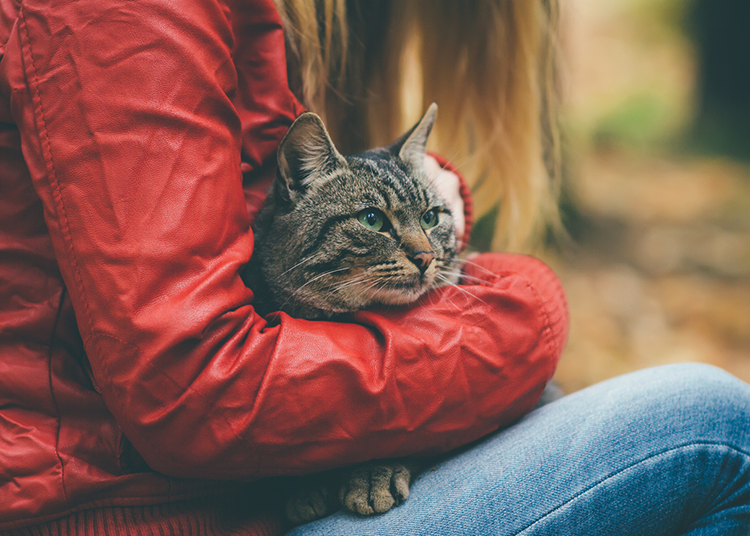In the wake of hurricanes Harvey, Irma, Jose, and Katia, much of the U.S. and its surrounding islands have been left devastated. While many images have already begun to surface of people rescuing animals who have suffered the effects of these storms, the true ramifications of these tragic natural disasters have yet to be measured, and many have been left homeless due to these catastrophes. It is incredibly difficult for most to find a way to mentally process these disasters, and many times we are faced with the daunting question; what if something like this happened to me?
Just like the people in these images, my first thought always lands on my baby, Marzipan. What if she ran away? What if she were swept up by the storm? How can I make sure she is safe should something cataclysmic happen to my city? Similarly, what if I stumbled upon an animal who was injured, abandoned, or somehow left behind? These are all important questions, and it is never a bad idea to make sure you have a plan in place should something like this happen to you.
Preparing Your Pet
First, let’s tackle the question of how to keep our own pets safe. As many of you may know, it’s never a bad idea to microchip your animal. Microchipping your pet is his or her best chance at reuniting with you should they become lost. You can get your baby microchipped at virtually any veterinary clinic, and the cost is usually around $45; a small price to pay to ensure that your snugglewumpkins are able to return to your loving arms should he run astray.
Secondly, it’s not a bad idea to get your cat used to his cat carrier. Leave the carrier out with lots of comfy blankets and familiar toys inside so that your cat will become used to it and even use it as a resting place. Doing this will make it easier to “lure” your kitty into the carrier should you need to evacuate your home in a hurry. If your cat recognizes her carrier as a safe and familiar place, she will be more likely to crawl inside of it, which is especially helpful if there is a lot of panic and rushing around that could potentially spook your baby into hiding somewhere where it’ll be difficult to find her.
Next, keep a bag of emergency cat supplies prepared in case of an evacuation. Cans of food, blankets, a collapsible water dish and water bottles are all necessary items you should have on hand in case of a crisis. Also be sure to keep a collar on your kitty at all times with a nameplate and phone number should she escape. Better safe than sorry!
Finding A Misplaced Animal
Preparing your beloved babykins is essential to making sure they stick with you during a storm, but what are you to do if you find a lost or wounded animal amidst all the brouhaha? If they have a collar, tracking down their owners after the storm has passed will hopefully not cause much of an issue. The same can be said if they have a microchip key. If they have no identification, well – it’s down to the old school ways of “Missing” posters, word of mouth, craigslist ads, and trips to the local vet to put the word out. The best you can do is try encouraging them to stay in your care, taking them to a vet to tending to their wounds, and crossing your fingers. It will all be worth it though when a very appreciative pet parent comes for their missing baby!
 But what if you find a non-domestic animal like a raccoon, chipmunk, or opossum? One woman found a baby squirrel after Hurricane Isaac and, luckily, was able to nurse her back to health! Little Jill has since been doing better than ever, and even has her own Instagram account where all her fans can keep up-to-date on all the excitement going on in her life! Uplifting to know there is always a silver lining in every disaster, eh? Well, if you stumble upon a babe in need, just make sure you approach with caution. Rabies is a thing that you probably [read: definitely] do not want, so keep that in mind. Smaller rodents like Jill, especially babies, will probably not pose much of a health threat to you or your own precious pumpkins. Similarly, opossums, as it just so happens, do not carry rabies! Ever! They’re 100% snuggable and perfect in every way. But don’t allow that to keep you from approaching with a healthy dose of wariness. A wounded mama may still lash out in fear if she’s got some little babies in tow, so keep that in mind. If like me, you are wont to scoop up any and every animal you see, it’s best to keep your local Animal Control’s number on hand. Or speed dial. You know, whichever.
But what if you find a non-domestic animal like a raccoon, chipmunk, or opossum? One woman found a baby squirrel after Hurricane Isaac and, luckily, was able to nurse her back to health! Little Jill has since been doing better than ever, and even has her own Instagram account where all her fans can keep up-to-date on all the excitement going on in her life! Uplifting to know there is always a silver lining in every disaster, eh? Well, if you stumble upon a babe in need, just make sure you approach with caution. Rabies is a thing that you probably [read: definitely] do not want, so keep that in mind. Smaller rodents like Jill, especially babies, will probably not pose much of a health threat to you or your own precious pumpkins. Similarly, opossums, as it just so happens, do not carry rabies! Ever! They’re 100% snuggable and perfect in every way. But don’t allow that to keep you from approaching with a healthy dose of wariness. A wounded mama may still lash out in fear if she’s got some little babies in tow, so keep that in mind. If like me, you are wont to scoop up any and every animal you see, it’s best to keep your local Animal Control’s number on hand. Or speed dial. You know, whichever.
Keep in mind that, just like humans, animals become agitated in stressful situations (duh). Have patience and keep a cool head when you are faced with uproar and panic, and you will be much better suited to care for your pets in the wake of a disaster. Your babies are relying on you to keep them safe, so never bring a new animal into a situation that would harm your own pet. Babies first, other animals second. The best thing you can do is be knowledgeable, be prepared, and be safe. Good luck!






